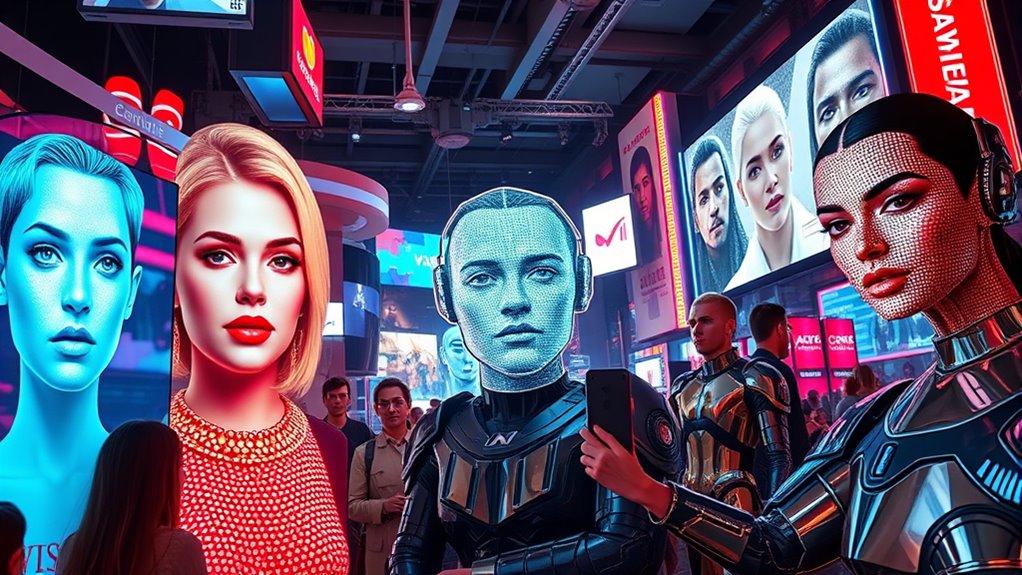In the metaverse, celebrity avatars create legal gray areas around ownership, rights, and control. You may wonder who owns or can replicate these digital personas, as current laws struggle to keep pace with rapid technological developments. Licensing and enforcement are often vague, leading to potential misuse or reputation risks. If you want to understand how these issues could impact celebrities and brands, more vital details await your exploration.
Key Takeaways
- Ownership rights of digital celebrity avatars are unclear, leading to potential disputes over creation, modification, and use.
- Existing IP laws struggle to address unauthorized replication or infringement of virtual representations in the metaverse.
- Licensing and contractual frameworks for avatar rights are often vague or absent, complicating rights management.
- Unauthorized use or misrepresentation of avatars can harm celebrity reputation and dilute brand identity.
- Legal standards for controlling, licensing, and protecting digital avatars lag behind technological advancements.

As the metaverse continues to evolve, celebrities are increasingly turning to digital avatars to connect with fans in innovative ways. These virtual representations allow you to experience their personality, style, and brand without physically being present. But this surge in digital avatars raises complex questions around intellectual property and digital identity. When you see a celebrity’s avatar, it’s more than just a digital image; it’s a carefully crafted piece of intellectual property that embodies their likeness, voice, and persona. Who owns that avatar? Can someone else create a similar digital version and claim it as their own? These questions open up a legal gray area, as existing laws struggle to keep pace with fast-changing metaverse technologies. The rapid development of digital technology underscores the urgent need for clearer legal standards to protect celebrity identities online. Your digital identity as a celebrity is valuable. It’s not just your image but also your brand, reputation, and the unique attributes that make you recognizable. When someone replicates your avatar without permission, it can cause confusion among fans or even damage your brand’s integrity. This is where intellectual property rights come into play. Copyright law might protect your original digital content, but it’s often less clear how it applies to digital avatars, especially if they’re generated or modified by third parties. Trademark rights could also be relevant if your avatar becomes a symbol of your brand, but enforcement can be tricky in a decentralized virtual space.
Digital celebrity avatars blur legal lines around ownership, rights, and identity in the rapidly evolving metaverse.
The challenge lies in establishing clear ownership and control over these digital identities. If a company or individual creates an avatar based on your likeness, do you have the legal right to restrict or monetize its use? Are there licensing agreements that can govern who can create or modify your digital persona? Currently, many of these issues are unresolved, leaving celebrities and creators in a legal gray area. It’s not just about protecting your digital identity but also about ensuring you retain control over how your likeness is used and represented in the metaverse.
As you navigate this landscape, it’s essential to consider the importance of contractual protections and rights management. Without clear legal frameworks, you risk unauthorized use, misrepresentation, or even exploitation of your digital persona. While technology continues to advance rapidly, the legal systems need to adapt to safeguard your intellectual property and digital identity effectively. Until then, you must stay vigilant and proactive in managing your virtual presence, understanding that the boundaries of ownership and rights are still being defined in this emerging digital frontier.
Frequently Asked Questions
Can Celebrities Control Their Digital Avatars’ Behavior in the Metaverse?
You might wonder if celebrities can control their digital avatars’ behavior. In the metaverse, virtual ownership and digital authenticity play key roles. Celebrities often have some say over their avatars through agreements with creators or platforms, but full control isn’t always guaranteed. As technology evolves, you’ll see efforts to guarantee their digital authenticity, helping them manage how they’re represented and behave, though challenges remain in enforcing these controls.
How Do Copyright Laws Apply to Celebrity Likenesses in Virtual Worlds?
Imagine the allure of celebrity endorsements in virtual worlds, where digital rights come into play. Copyright laws protect celebrity likenesses, meaning you can’t use their images or digital avatars without permission. If you’re creating or sharing content, you need to respect these rights to avoid legal trouble. Fundamentally, just like in traditional media, celebrities hold rights over their likenesses, making it essential to navigate this digital landscape carefully.
What Happens if a Celebrity’S Avatar Is Involved in Illegal Activities?
If a celebrity’s avatar is involved in illegal activities, you could face serious legal and reputation issues. Virtual misconduct may lead to lawsuits or damages, especially if their likeness is used without permission for endorsements or virtual activities. As someone managing or engaging with these avatars, you should guarantee proper rights and clear boundaries, so you don’t get entangled in legal disputes or harm the celebrity’s reputation through wrongful virtual conduct.
Are There Existing Legal Frameworks for Managing Avatar Impersonation?
You wonder if legal frameworks address avatar impersonation, especially regarding virtual identity and ethical considerations. Currently, laws are limited and vary by jurisdiction, often focusing on copyright or fraud. You should be aware that some regions are developing rules to protect virtual identities, but extensive regulation remains uncertain. As you navigate the metaverse, it’s vital to contemplate ethical implications and advocate for clearer laws to safeguard against impersonation and misuse.
How Do Privacy Rights Extend to Celebrity Avatars in the Metaverse?
You might wonder how privacy rights extend to celebrity avatars in the metaverse. Privacy boundaries become blurred because digital footprints of these avatars can reveal personal information, raising concerns about misuse or unauthorized data collection. As you engage with celebrity avatars, it’s essential to recognize that your digital footprint can be tracked and potentially exploited, making privacy protections vital to safeguard your personal data and maintain control over your virtual interactions.
Conclusion
As you navigate the evolving world of celebrity avatars in the metaverse, remember that the line between likeness and rights blurs like a mirage. Just as shadows shift with the sun, so do legal boundaries—constantly in flux. Staying informed and vigilant becomes your shield, ensuring you don’t get lost in this digital maze. Because in a domain where virtual identity intertwines with real-world fame, safeguarding your rights is the key to truly owning your presence.








